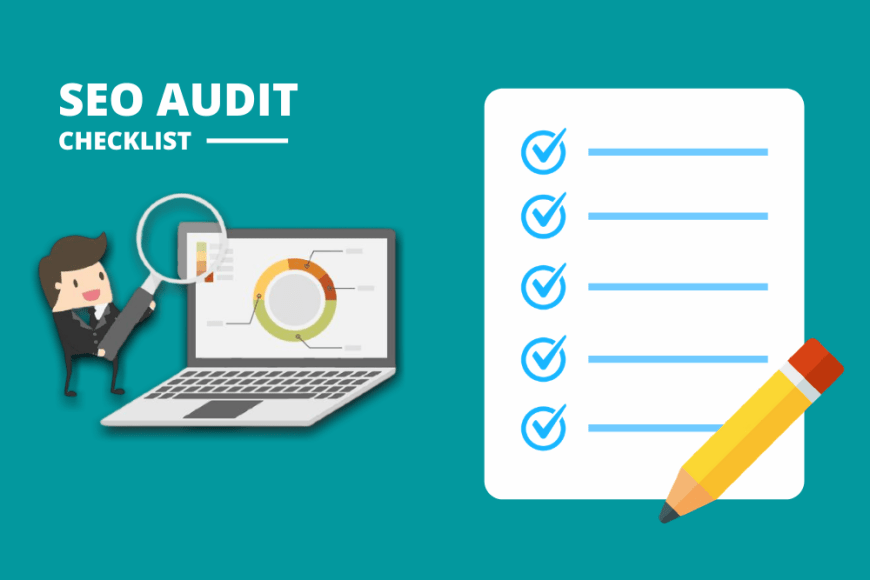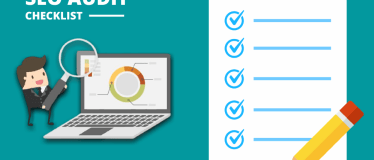A website that can't achieve first page rankings for the keywords you are targeting will quickly turn into a liability rather than an investment. If you aren't satisfied with your site's performance, or it's dipping into the second, third, or worse pages of the search results, it's possible your SEO efforts are behind your lacklustre results. An SEO audit will help you get it back on track.

SEO isn’t just for established websites that are floundering in the search results. Web development and SEO experts can work together to create a brand-new website that delivers fantastic user experiences, fast load times, and exceptional value to the reader. These are all qualities in a site that Google loves and rewards with first-page rankings.
What is an SEO Audit?
An SEO audit is a system that examines the variables affecting how the search engine's view your website. If parts of your site score poorly, then it will rank lower than a competing website.
Google's algorithm monitors hundreds of variables, and it's not possible to know what Google is thinking exactly or how its algorithm calculates rankability. However, we have years of data showing us what works and what doesn't. For example, fast page loading times are critical to positive user experiences.
If your pages are loading slower than 2.5 seconds, then a significant portion of your visitors are not waiting for the page to load and are skipping back to the search results.
If visitors don't like a slow site, neither will Google. We know from experience that increasing website speed can deliver significant improvements in your site’s performance in the search results. Speed is just one of the variables we look at when performing an SEO audit; there are many more.
The goal of a website SEO audit is to critically examine every area of your website where you can make tweaks and fixes to improve its 'rankability' score.
How Does SEO Fit into Your Marketing Strategy?
Understanding where SEO fits into your marketing strategy is an excellent first step towards grasping its importance. Optimising your site for the search engines helps you attract organic traffic to your company. Organic traffic is any visitor who clicks through from the search results and not by way of a paid ad.
Organic traffic provides a significantly higher ROI than any other marketing strategy because SEO helps you:
- Connect with customers before they even know they need your product or service
- Attract a curious audience who are still in the research/comparison phase of the sales pipeline
- Reach customers who are ready to buy
When you know what you want SEO to do for your website, you will be in a better position to make the improvements you need to get the results you want. You can use this checklist to ensure you don't miss anything in an SEO audit.
1. Crawl Your Site
Google uses crawlers (web bots, Googlebots, or Bingbots) to crawl through your site to examine the structure and content. As the Googlebot works its way through your site, it will be 'scoring' every element and comparing it against others to determine where it 'thinks' your site should sit in the search results.
It's possible to crawl a site yourself to see how it stacks up against the competition. Screaming Frog [*screamingfrog.co.uk] provides a version of an SEO spider that simulates the behaviour of a crawl bot as it trawls your site. You have tons of options to configure how you want the bot to behave, like a Googlebot or Bingbot, for instance.

If you have a lot of pages, expect the report to be some time in coming, but in the end, you will have a comprehensive list of improvements you can make to your site to improve its performance.
2. Find and Fix Technical Problems and Indexing Errors
SEO audits are tailor-made for finding technical problems like page speed, and indexing errors like duplicate content. Be on the lookout for:
Broken links (links to pages that no longer exist or have typos)
- Duplicate content
- Redirects
- Meta tags that are too long or too short
- Images not displaying
- Noindex tags
3. Get Rid of Low-Quality Content

Regularly publishing content for the sake of it won't necessarily improve your site rankings. If you have any pages or posts that don't add any value to your visitor or fail to address the search query (keyword) they are targeting, then you should either delete it or improve it.
If you are using a CMS like WordPress, Google may have indexed many unnecessary pages. Make sure you use a setting to automatically turn off indexing for these pages, which can save you quite a bit of manual labour from deleting them yourself.
Streamlining your site's content (often referred to as content pruning) can yield significant rewards, with some high-profile websites reporting a 44% [*1] increase in traffic after deleting thousands of pages.
4. Robots.txt and Robots Meta Tags
The robots.txt file is essential for telling Google that you want your site indexed, but it's also handy for keeping pages out of the index. It's a simple fix, but one that often slips off the radar of inexperienced website creators.
The robots meta tag (found in the section of HTML code) also allows you to fine-tune how a page is indexed and delivered to site visitors.
5. Test Your Site's Speed and Mobile Responsiveness
Site speed is incredibly important to Google, mostly because a slow site creates a terrible user experience. Google wants to provide the best user experience possible and will heavily penalise slow sites.
You can use a tool like Pingdom.com [*tools.pingdom.com] to test your page load speeds from different locations around the globe. Once the test is complete, Pingdom provides you with a report detailing areas where you could make improvements.
Unless you have experience in web development, there may appear to be a lot of mumbo jumbo in this report. Check with your SEO expert (the SEO Assassin) about any items you do not understand or need help with.
Mobile search is now where all the search action is, which is why Google has adopted a mobile-first policy for websites. If your site has usability issues on mobile devices, then fixing them will prove beneficial for SEO and ranking your website.
6. Fix Structured Data Errors
Content pages like reviews, product comparisons, and service pages can all benefit from structured data. You can think of structured data as a table like you would see in MS Excel, where each cell contains a discrete value. Google provides a free tool [*https://developers.google.com/structured-data/testing-tool/] where you can check your structured data for errors.
7. Fix Meta Titles and Meta Descriptions
Meta titles and meta descriptions may not affect your rankings directly, but who knows (other than Google), because Google isn’texactly forthcoming with information on how they rank pages. However, creative use of keywords and phrasing can create a more eye-catching and clickable link.
The goal of the title and descriptions is to give Google users a clear idea about what they will get out of reading your content. Use your keywords in the title and the description. A description should be less than 160 characters. Any more than that and Google will deprecate the link in the search results.
8. Analyse Your Traffic

Most of your organic traffic, especially on a new website, will come from long-tail keywords, which are search phrases containing three or more words. The best way to find out which keywords you need to focus on, is to use Google's Search Console [*https://search.google.com/search-console/about] and Google Analytics [*https://analytics.google.com] to discover the keywords Google has used to index your site.
9. Spy on Your Competition
There is a straightforward and precise way to find out what is working for your competition; use any search phrase you want to rank for and examine the top results.
Of course, it often takes knowledge and experience to delve into a competitor's SEO efforts. Your local SEO expert (the SEO Assassin) will be able to provide the necessary insight to find out what is working for your competitors and help you duplicate the results for your business.
10. Improve Your Content and On-Page SEO
It's not just backlinks that can boost your search results. Content that adds value and answers a searchers query or solves their problem is critical to gaining higher rankings, as is how you deliver that information.
Break up large areas of text with relevant H2, H3, and H4 tags using your most important keywords. Add eye-catchingimages and use whitespace to make your pages easier to digest. Most of your visitors will be quickly scanning your text for the information they need, and will be put off by large swathes of text.
11. Investigate Your Internal Linking
Internal links might not have the power of an external backlink from another site, but there is a growing consensus among SEO experts that internal links may be used by Google to gauge the importance of a page.
Have you been linking too many times to pages that lack relevance, or which target keywords with low search volume? Do you not have enough internal links? These are all issues you will need to address in your SEO.
12. Get More Backlinks
We will never know how much importance Google places on backlinks in terms of ranking. However, we do know they have shifted focus from quantity to context and authority.
For instance, a link from a trade directory is easily acquired and so will have little weight for ranking, but a link from an authority site indicates you have quality content that is worth mentioning.
Finding high-quality backlinks is key to improving your rankings. Reach out to webmasters who have linked to your competitors and let them know that you have content that is better or adds more information that will help their readers. Of course, this strategy will hinge on you having top-quality content that is worth a link.
Track Your Results
When you make any changes to your site, you will want to know if it has hindered or helped your SEO efforts. If you are not tracking your results, you will never know if your efforts will bear fruit, or what strategies you should continue with, or the ones you need to drop.
A Quick Checklist for Recurring Audits
An SEO audit is not a one and done process. You will need to periodically check your site to ensure it is still aligned with good SEO practices - which can change with alarming regularity. Here's a quick checklist to ensure you don't miss anything

1. Check indexed pages using site: search, and analyse pages that aren't getting the results you expect.
2. Check Google Analytics for the number of indexed landing pages. Does it match up with your site: search results? 3. Check the search results for brands and brand-related terms. Are you showing for searches on your brand?
4. Check Google's cache for important pages. Do they have navigation links and is the content appearing?
5. Check your site in mobile search and analyse them for mobile responsiveness.
6. Check your meta title and description tags for optimisation (keywords and character length).
7. Ensure mission-critical pages have optimised meta titles and descriptions. Add ones that may be missing.
8. Ensure each page contains unique and optimised content and adds value to the reader.
9. Ensure image file names contain keywords, not weird combinations of numbers and letters.
10. Are your URLs descriptive and do they contain your keywords?
11. Ensure URLs are free from non-standard characters and are static.
12. Use as short as URL as possible (don't use stop words like in, and, the, and is)
SEO optimisation is a digital marketing strategy that can deliver a significant return well over your investment, often for years with only minor maintenance and updates. If you are busy taking care of your business but would like to improve your results without spending months learning the intricacies of SEO, then get in touch with your local SEO expert , the SEO Assassin today.











